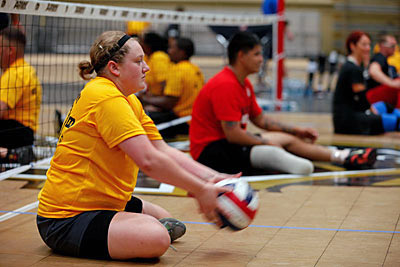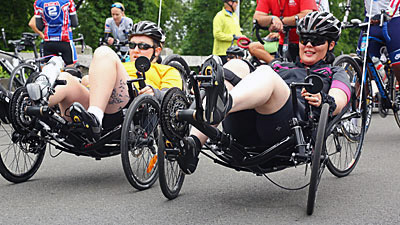Written by Suzanne Ovel
Warrior Transition Command
 West Point, NY – The day that Spc. Amanda Lyle walked out of the Jefferson Barracks VA Hospital Polytrauma Clinic, a doctor stopped and asked her, “You know you’re a miracle, right?”
West Point, NY – The day that Spc. Amanda Lyle walked out of the Jefferson Barracks VA Hospital Polytrauma Clinic, a doctor stopped and asked her, “You know you’re a miracle, right?”
So she had been told, but Lyle said that she thankfully didn’t remember those first few weeks after a bad car accident in El Paso, Texas, in November 2012, which caused a severe traumatic brain injury, along with bleeding in her brain, a broken scapula and two broken vertebrae.

And she remembers knowing that she wanted to get back to doing what she loved, including sports.
“I was really active before my injuries, and I just wanted to get back into it. I love sports, period. I love being active,” said Lyle, who had been on a fast track before her injury as a Patriot launching station enhanced operator/maintainer.
Despite averaging 17 medical appointments every four days as a part of Fort Campbell’s Warrior Transition Unit, Lyle, who played softball and volleyball in high school, was itching to be active again.
She knew about recumbent cycling because of her WTU’s adaptive reconditioning program, and she was convinced she could ride safely, even with her post-traumatic seizure disorder, since others would ride with her.

“The only thing I really had my heart set on was cycling … they finally got me on that bike and [then] I wanted to do everything,” said Lyle, who immediately got into cycling, yoga and spin class, and has since tried out other sports such as rock climbing.
“Even if they had to modify something for me because of my injuries, it still kind of gave me a sense of hope,” she said.
“Now I’m here and I’m going to fight for it,” said Lyle, who was encouraged to try out for Warrior Games by her ARP team at Campbell.
She emphasized that although she wants to be competitive, to her, adaptive reconditioning means more than the chance to bring home a gold medal.
“I’m here to compete, too, don’t get me wrong; I want to win,” she said. “But being able to participate in something like this again, regardless of my injuries, it inspires me. It lifts me up.”
She’s quick to give credit to the people who showed her ways to adapt her activities, and encouraged her to not give up, to cycle harder and throw further.
“I want to say a huge thank you to the WTU at Fort Campbell and the ARP program for pushing me,” said Lyle.
More than that, Lyle credits her unit for helping her to manage her numerous medical appointments as well as the emotional aftermath of her accident.
“The Warrior Transition Unit, in my opinion, was a lifesaver,” she said.
In fact, thanks to her therapists at Fort Campbell and at Jefferson Barracks, Lyle now wants to pursue becoming a therapist herself when she leaves the Army.
“They just helped me so much,” said Lyle, whose car accident caused her to miss deploying with her unit just six days before they departed.
“I want to be a successful Veteran still serving my country,” she said.
She also wants to keep cycling after she leaves the Army, and maybe even compete in future Warrior Games as well.
“I feel like it’s given me hope and a future now. I want to be cycling for the rest of my life now; I love it that much,” said Lyle.
“I feel like I can go participate and be free again; I don’t have limitations,” she said.


